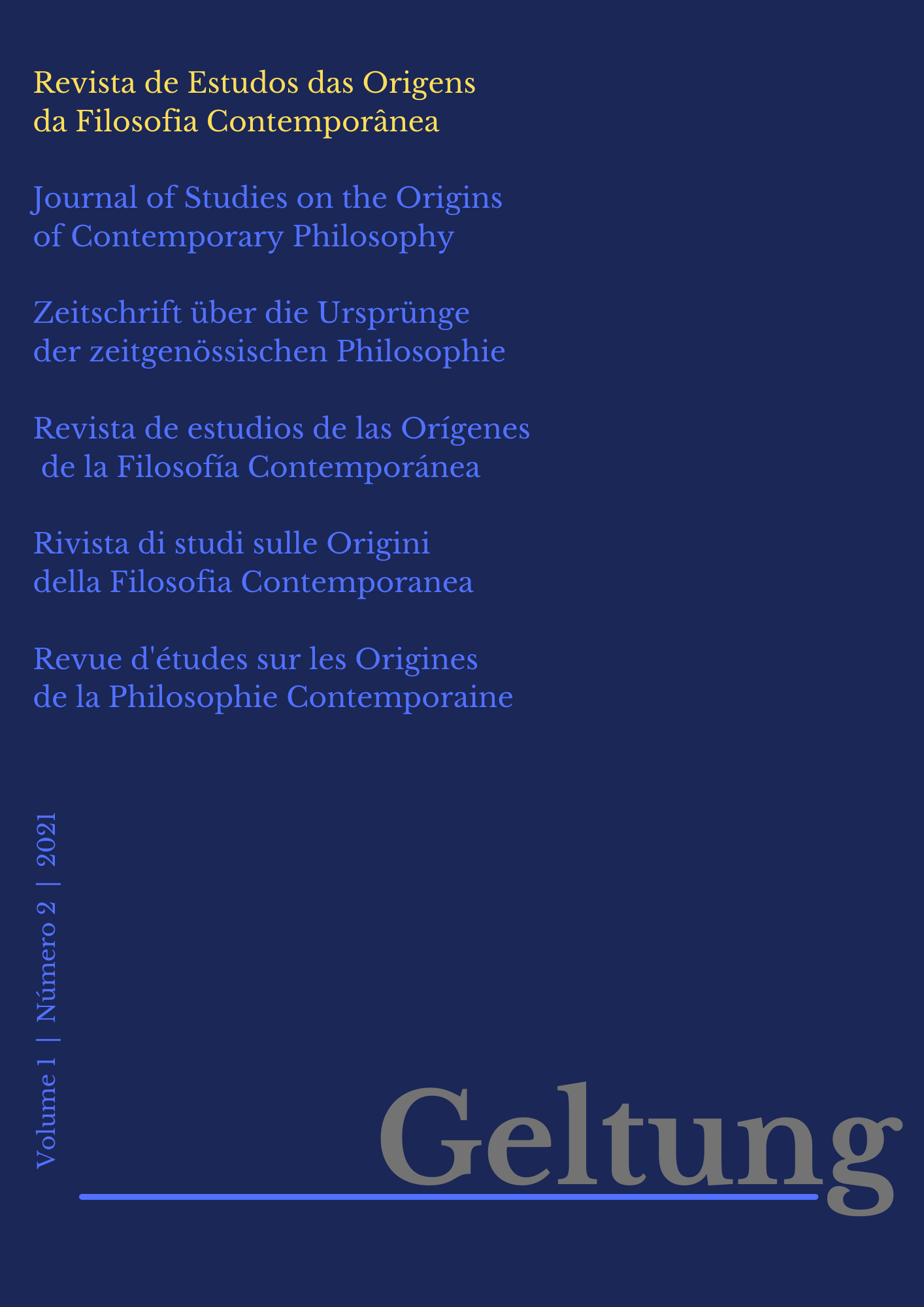The struggle for Existence and the Ideal
Friedrich Albert Lange's Political Teleology at the Intersection of Schiller and Darwin
DOI:
https://doi.org/10.23925/1764-0892.2021.v1.n2.e61293Keywords:
Friedrich Albert Lange, Neokantianism, Social Darwinism, Friedrich Schiller, Kantian Socialism, TeleologyAbstract
Friedrich Albert Lange was a neo-Kantian and a socialist. Scholars have questioned whether there is a connection between these two aspects of Lange’s work. The paper argues that such a connection is apparent once Lange’s philosophy is understood in light of Schiller’s Kantianism. According to Lange, Schiller’s aesthetic redemption consists of two tasks: to create the beautiful image of an ideal reality; and to realize this ideal model in the actual world. Accordingly, I show that Lange’s political analysis points to three different types of social evolution: 1) one corresponding to the natural state of humanity, based on Darwin’s and Malthus’s concept of the struggle for survival; 2) one corresponding to ideal evolution, in which all human beings achieve full development of their talents (first task of the esthetic redemption); 3) one corresponding to the actual realization of this ideal, in which human beings advance step by step thanks to social experimentation and the resulting progress in knowledge (second task of esthetic redemption).
References
BAXLEY, Anne Margaret. “Pleasure, Freedom and Grace: Schiller’s ‘Completion’ of Kant’s Ethics”. Inquiry 51, no. 1 (2008): 1–15.
BEISER, Frederick. Schiller as Philosopher: A Re-Examination. Oxford: Oxford University Press, 2005.
BEISER, Frederick. The Genesis of Neo-Kantianism. 1796-1880. Oxford: Oxford University Press, 2017.
BERNSTEIN, Eduard. Evolutionary Socialism: A Criticism and Affirmation. New York: Schocken, 1961.
BERNSTEIN, Eduard. “Zur Würdigung Friedrich Albert Lange’s”. Die Neue Zeit 10 (1892, 1891): 68–78, 101–9, 132–41.
BUHR, Manfred. “Neukantianismus”. In BUHR, Manfred; KLAUS, Georg (eds). Philosophisches Wörterbuch, 11th ed., 863–65. Leipzig, 1975.
COHEN, Hermann. Einleitung mit kritischem Nachtrag zur neunte Auflage der Geschichte des Materialismus von Friedrich Albert Lange. 3rd ed. Leipzig: Brandstetter, 1914.
ELLISSEN, Otto Adolf. Friedrich Albert Lange: Eine Lebensbeschreibung. Leipzig: Baedeker, 1894.
FREIMUTH, Frank. Friedrich Albert Lange - Denker Der Pluralität. Erkenntnistheorie, Paedagogik, Politik. Frankfurt am Main: Peter Lang, 1995.
HOLZEY, Helmut. “Philosophische Kritik. Zum Verhältnis von Erkenntnistheorie und Sozialphilosophie bei F. A. Lange.” In KNOLL, Joachim H.; SCHOEPS, Julius H. (eds). Friedrich Albert Lange: Leben und Werk, 207–25. Duisburg: Walter Braun, 1975.
HUMBOLDT, Wilhelm von. Studienausgabe. In MUELLER-VOLLMER, Kurt (ed). 3 Bänden: Ästhetik und Literatur. Frankfurt am Main: Fischer-Bücherei, 1970.
JACOBSEN, Bjarne. Max Weber und Friedrich Albert Lange: Rezeption und Innovation. Wiesbaden: Deutscher Universitätsverlag, 1999.
KAUTSKY, Karl. Vermehrung und Entwicklung in Natur und Gesellschaft. Stuttgart: J.H.W. Dietz, 1910.
KNOLL, Joachim H.; SCHOEPS, Julius Hans. Friedrich Albert Lange: Leben und Werk. Duisburg: Walter Braun, 1975.
KÖHNKE, Klaus Christian. The Rise of Neo-Kantianism: German Academic Philosophy between Idealism and Positivism. Cambridge: Cambridge University Press, 1991.
LANGE, Friedrich Albert. Die Arbeiterfrage. Ihre Bedeutung für Gegenwart und Zukunft. 2nd ed. Winterthur: Bleuler-Hausheer, 1870.
LANGE, Friedrich Albert. Die Arbeiterfrage. Ihre Bedeutung für Gegenwart und Zukunft. 3rd ed. Winterthur: Bleuler-Hausheer, 1875.
LANGE, Friedrich Albert. Einleitung und Kommentar zu Schillers philosophischen Gedichten. Bielefeld, Leipzig: Velhagen & Klasing, 1897.
LANGE, Friedrich Albert. Geschichte des Materialismus und Kritik seiner Bedeutung in der Gegenwart. Iserlohn: Baedeker, 1866.
LANGE, Friedrich Albert. History of Materialism and Criticism of his Present Importance. Translated by Ernst Chester Thomas. 3rd ed. 3 vols. 1875. Reprint, London: Kegan Paul, Trench, Trübner, 1892.
LANGE, Friedrich Albert. Mills Ansichten über die soziale Frage und die angebliche Umwälzung der Sozialwissenschaft durch Carey. Duisburg: Falk & Lange, 1866.
LANGE, Friedrich Albert. Über Politik und Philosophie: Briefe und Leitartikel. 1862 bis 1875. Edited by Georg Eckert. Duisburg: Walter Braun, 1968.
LINDEN, Harry Van der. Kantian Ethics and Socialism. Indianapolis, Cambridge: Hackett, 1988.
MARX, Karl. Capital. A Critique of Political Economy. Translated by Ben Fowkes. Vol. 1. 1867. Reprint, London: Penguin UK, 1992.
LÓPEZ, Acosta; ROSARIO, María Del; POWELL, Jeffrey L. Esthetic Reason and Imaginative Freedom: Friedrich Schiller and Philosophy. Albany: State University of New York Press, 2018.
MEHRING, Franz. “Die Neukantianer”. Die neue Zeit, 1899, 33–37.
MORGAN, Roger. The German Social Democrats and the First International: 1864-1872. Cambridge: Cambridge University Press, 1965.
MURRAY, David J. The Creation of Scientific Psychology. Routledge, 2020.
OLLIG, Hans-Ludwig (ed). Der Neukantianismus. Stuttgart: J.B. Metzler, 1979.
PORTER, Theodore M. The Rise of Statistical Thinking, 1820-1900. Princeton, NJ: Princeton University Press, 1988.
REICHESBERG, Naúm. Friedrich Albert Lange als Nationalökonom. Bern: K.J. Wyss, 1892.
RICHTER, Friedrich, and Vera Wrona. “Neukantianismus und Sozialreformismus”. Deutsche Zeitschrift für Philosophie 22, no. 3 (1974): 269–88.
RUSSO KRAUSS, CHIARA. “Friedrich Albert Lange’s Theory of Values”, British Journal for the History of Philosophy, (forthcoming).
RUSSO KRAUSS, CHIARA. “On Grace and Dignity”. In Complete Works of Friedrich Schiller, 8:175–210. 1795. Reprint, New York: P.F. Collier, 1902.
RUSSO KRAUSS, CHIARA. On the Esthetic Education of Man. 1795. Reprint, Penguin Books, 2016.
SCHILLER, Friedrich. “On Grace and Dignity”. In The Works of Frederick Schiller. IV. Poems and Essays, 175–229. 1793. Reprint, Boston: S. E. Cassino & Company, 1884.
VEGA, Rafael de la; SANDKÜHLER, Hans Jörg (eds). Marxismus und Ethik: Texte zum neukantianischen Sozialismus. Frankfurt am Main: Suhrkamp, 1974.
VORLÄNDER, Karl. Kant und Marx; ein Beitrag zur Philosophie des Sozialismus. Tübingen: J.C.B. Mohr (Paul Siebeck), 1911.
WIDMER, Elisabeth Theresia. “Friedrich Albert Langes Materialistisch-Poetische Kant-Interpretation und die Konsequenzen in der Ethik”. In HEIDENREICH, Hauke; STENGEL, Friedemann. Kant Um 1900. Hallesche Beiträge Zur Aufklärungsforschung. Berlin: De Gruyter, 2021.
WIDMER, Elisabeth Theresia. “Psychophysiological Transcendentalism in Friedrich Albert Lange’s Social and Political Philosophy”, Journal of Transcendental Philosophy 3, no. 2 (2022): 253–75.
WIDMER, Elisabeth Theresia. Left Kantianism in the Marburg School (forthcoming).
WIGAND, Albert. Der Darwinismus und die naturforschung Newtons und Cuviers. Beiträge zur methodik der naturforschung und zur speciesfrage. Vol. 1. 2 vols. Braunschweig: F. Vieweg und Sohn, 1874.
WILLEY, Thomas E. Back to Kant: The Revival of Kantianism in German Social and Historical Thought, 1860-1914. Detroit: Wayne State University Press, 1978.
ŽIŽEK, Slavoj. In Defense of Lost Causes. London, New York: Verso, 2009.
Downloads
Published
How to Cite
Issue
Section
License
Copyright (c) 2023 Geltung - Journal of Studies on the Origins of Contemporary Philosophy

This work is licensed under a Creative Commons Attribution 4.0 International License.

This work is licensed under a Creative Commons Attribution 4.0 International License.






